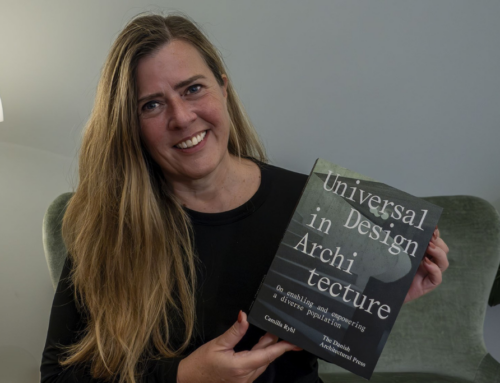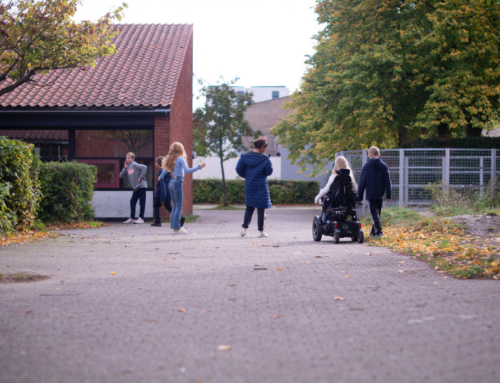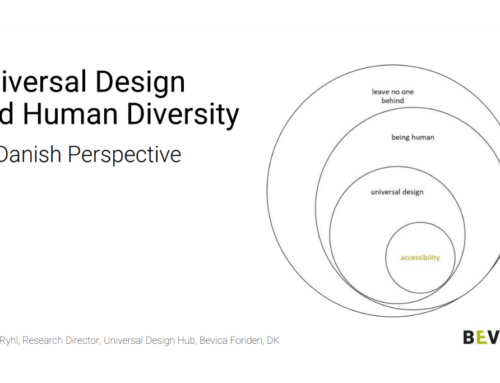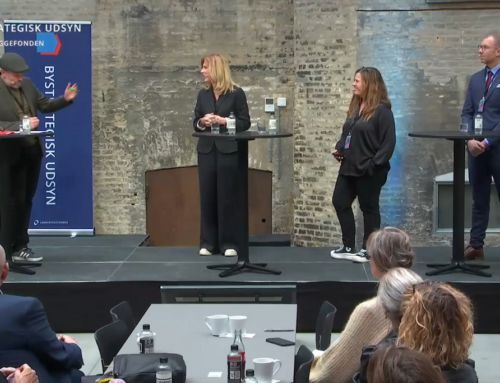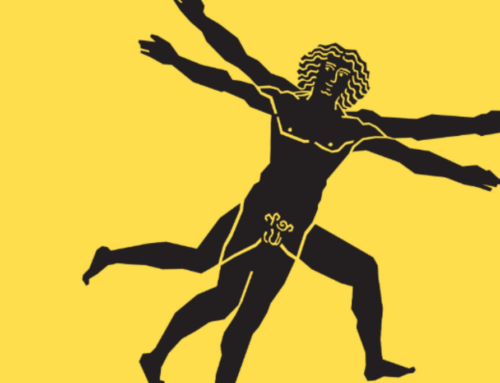
Poetry as a method to provide new knowledge about lives of individuals with disability
Olivia Dahl’s PhD project examines how individuals with cerebral palsy experience and describe everyday life. Part of her data collection involves writing workshops at which she asks participants to write collectively about their memories, bodies and dreams.
by Nanna Stærmose. The article is published on 14/03/2023.
What is everyday life like for someone with cerebral palsy and what are the barriers and potentials for living ‘rich’ and thriving? This is the question behind a PhD project by Olivia Dahl from the Department of Sociology, University of Copenhagen. She has chosen to supplement traditional research tools such as interviews and questionnaires with writing workshops, at which she and the Danish poet Caspar Eric create a space for participants to write down their memories of everyday life situations with disability and their dreams for the future. The method may seem a little unusual, but according to Olivia Dahl, it opens the door to a unique type of knowledge.
“Poetry can unlock something inside people that we’d never be able to access through questionnaires or interviews,” she says and continues with an example:
“The majority of people with cerebral palsy have at some point undergone surgery, often several times. During the writing exercises, participants wrote things like: ‘I remember the smell of the anaesthetic’, ‘I remember needing to fit in’, and ‘I remember being afraid of being me’. These descriptions provide insight into what life is like with a disability,” says Olivia Dahl, who also uses qualitative interview methods and questionnaires in her PhD project.
The researcher do not yet have a complete picture of what life with cerebral palsy is like for the project participants. However, a pattern is emerging with regard to the barriers participants face in everyday life; not only physical barriers but barriers in the form of biases and stereotypes as well, that forces the individuals to perform a lot of identity and emotional work – which can be both stressing, time consuming and contributing to a sense of exclusion and otherness.
“Some participants remember being singled out as ‘wrong’ and feeling misunderstood, while others dream of moving through society without being stopped by stairs, unsafe ramps and judgmental stares. Many participants furthermore experience having trouble receiving the help or equipment they need, which is a huge problem,” says Olivia Dahl.
Disability concerns us all
Olivia Dahl mentions examples of how people with disability are not taken seriously are not well represented, and some still live marginalized lives – e.g. excluded from civil society, cultural events, educational systems and labor market. That is why she wants a more nuanced and balanced understanding of disability. She believes this would benefit society as a whole as she says: because, ultimately, most people will come face to face with disability at some point, e.g. as a consequence of age, pregnancy, injury or similar.
“Most people will have to deal with disability at some point in their lives, either personally or in someone they’re close to. Which is why I believe society could really benefit from learning about what life is like for people who have lived part or all of their lives with a disability and using this knowledge to create a society with respect and space for all. Disability is a part of human diversity and should be recognized and valued as such. People with disabilities have unique strengths, abilities, and perspectives that can contribute to society in important ways”.
The sociological perspective
Olivia Dahl is a sociologist and this came into play when choosing the topic of her PhD. She mentions two approaches to disability research: the biomedical approach, which focuses on disability as a biological defect, and the social model, which focuses on how society ‘disable’ people through societal barriers and stigma. The two approaches are in opposition. However, according to Olivia Dahl, the problem is that one approach forgets the body, while the other approach forgets context and surrounding society. Instead, Olivia Dahl wants to take offset in a post-social understanding of disability, also known as ‘Crip Theory’, where disability is considered a complex experience that in and of itself is not negative. This in inspired by the Professor Robert McRuer, who wrote the book Crip Theory, and whom Olivia is visiting in Washington D.C at the moment:
“We need a more nuanced of disability. Consider how often disability is unilaterally discussed as a tragedy, as something that needs to be fixed. This reinforces the idea of the able-bodied as superior, the norm or ideal, and the disabled body as inferior and abnormal. This contributes to ableism, which is the discrimination and prejudice against individuals with disabilities. ,” she says.
She hopes her PhD project can help encourage a more complex and respectful understanding of disability, where both financial priorities and identity-wise acknowledgement leads to equity, accessibility and dignity for everyone regardless of functional variations or disability.
Recommendations for additional reading
Oliver, M. (1990). Politics of disablement. Macmillan International Higher Education.
Dahl, O. (2021). Kandidatspeciale: Problematiserede identiteters blomstring: Et kvalitativt studie af unge voksne med Cerebral pareses identitetsarbejde i forhold til at realisere menneskelige goder og et godt og vellevet liv.
McRuer, R. (2006). Crip theory: Cultural signs of queerness and disability (Vol. 9). NYU press.
Egner, J. (2016). A messy trajectory: From medical sociology to crip theory. In Sociology looking at disability: What did we know and when did we know it. Emerald Group Publishing Limited.
Eric, C. (2023). Nye Balancer – Handicap digte. Gyldendal A/S.
Goffman, E. (2009). Stigma: Notes on the management of spoiled identity. Simon and Schuster.
Fenge, L. A., Hodges, C., & Cutts, W. (2016, May). Performance poetry as a method to understand disability. In Forum Qualitative Sozialforschung/Forum: Qualitative Social Research (Vol. 17, No. 2, pp. 1-13). DEU.
Olivia Dahl Nielsen
Sociologist
PhD student at the Department of Sociology, University of Copenhagen
Her PhD project examines how adults with cerebral palsy experience life and what it takes to live a good life in today’s society.
The project is being funded by the Elsass Foundation and is expected to be complete in 2025.
Member of the Bevica Foundation’s research network
Read more research profiles
